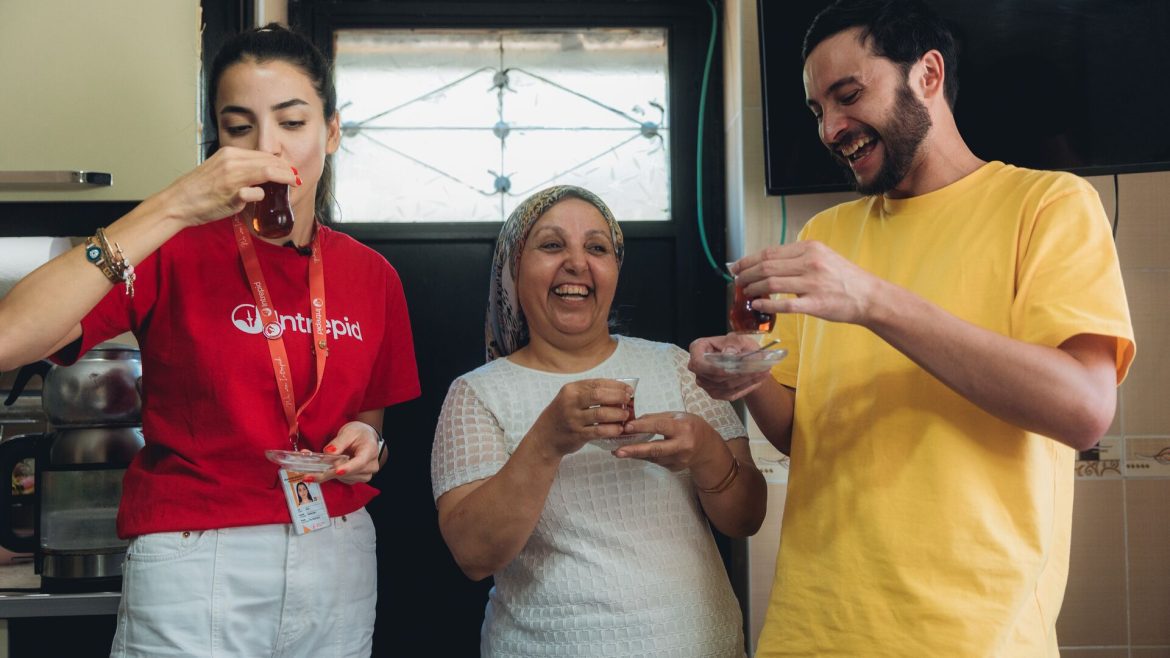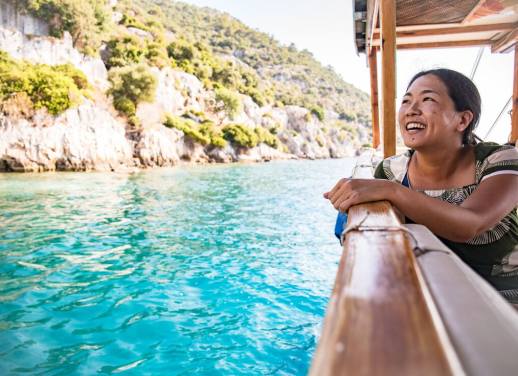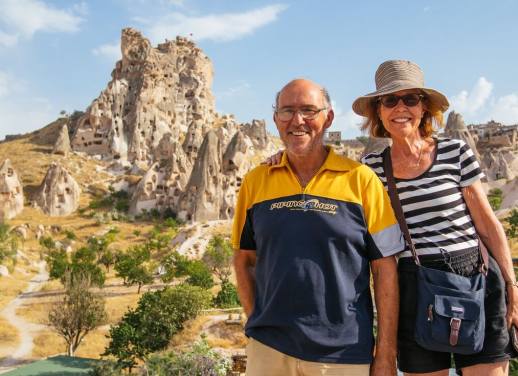On a small group adventure in Turkey, Meghan and her fellow travellers experience a welcome – and some award-winning baklava – that moves them all to tears.
We all giggled when JD started crying. Again. We couldn’t help it.
‘Oh, no,’ he laughed as soon as the tears started to pool, and I laughed as all of us started tearing up with him.
It had become a thing on this trip – these unexpected moments of emotion bubbling up out of nowhere. But they weren’t really out of nowhere. JD’s tears came when something real truly hit – a story shared, a connection made.
Like the day before when we visited a family-run pottery shop and learned about the 4000-year-old craft. Overwhelmed by the tradition having survived for generations, he connected with the craftsmen through his emotions. But in this moment it wasn’t just him. Rhem’s eyes glassed over, mine stung and our leader, Elif, wiped her cheek.
Nuray, our host, smiled as we reached for our napkins. ‘It’s the onions,’ she teased, motioning to her kitchen.
JD, Rhem, Elif and I were five days into our small group trip in Turkey, which included a visit to Nuray’s home for a home-cooked meal. I spent the last eight years dreaming of one day staying in a cave hotel in Cappadocia, and here I was sitting in someone’s cave home? Of course I was feeling emotional.
Turkey trips that might move you to tears
Sitting on Nuray’s worn sofa, my toes curling on a well-trodden carpet, I took a deep breath. Family photos lined the wall and the smell of slow-simmered tomato and garlic still lingered in the air. Rhem’s shoulders slowly lowered from her ears. It felt like our trip had been moving at full speed, but in this moment, time seemed to slow down.
Feeling comfortable can make you feel vulnerable. There’s something special about being comfortable enough to allow your walls to fall and your emotions to show. And now here we were, five people who had been strangers just moments before, crying over baklava.
Read more: Travelling through grief: How I found healing on a group trip to Morocco



Before the baklava
An hour earlier, our van weaved through Cappadocia’s honeycombed rock formations and tourist-packed streets full of souvenir shops before making a sharp turn up a quiet street. We hopped out at the bottom of the hill and started our ascent as cicadas buzzed, dust collected on our sandals, sweat pooled down my back and I regretted wearing a light-coloured shirt.
Elif pushed open the creaking gate that brought us to our host’s home where we would be sharing lunch together. We walked through the stone courtyard to a home made out of volcanic tuff – a light rock built into the landscape. Surrounded by plants and standing in front of the doorway covered by a white curtain blowing in the wind, Nuray stood on the threshold. Her smile was already reaching her eyes before a word was spoken, and we all found ourselves instantly smiling, too.
She greeted us like we were longtime friends coming over for lunch with a warm, soft hug that reminded me of my mom as her hand rubbed my back in greeting. Having spent the last three weeks away from home, I leaned into that feeling .
We weren’t the first guests she’s welcomed into her home, but she made us feel like we were. Her excitement was palpable and made us feel special as she ushered us inside, her smile never fading.
‘Intrepid comes into my home and I am very, very happy,’ she beamed. Nuray credits her beautifully spoken English to having welcomed Intrepid travellers into her home for the last 12 years. In an effort to tackle gender disparity in Turkey, Intrepid engages local, self-employed women to host activities, and now Nuray gets to share a piece of her home, her family and her culture with people from around the world.


A mother on the road
Elif had had an extra pep in her step that morning, energised for us to finally meet Nuray after having told us so much about her.
‘It’s very special, this visit,’ she kept sharing.
It was Eid al-Ahda, a holiday typically spent with family and loved ones sharing grape leaves and baklava, but Elif was spending her holiday with us. Elif and Nuray hugged for a long time and Elif’s eyes watered a bit – I realised this was her family on the road.
And for JD, it felt the same.
It’s been years since JD lived in his home country of New Zealand with his family, and he had been struggling with that distance leading up to this trip. Stepping into Nuray’s gave him the sense of home and familiarity he’s been craving.
‘I almost felt like her kids were bringing friends over to stay the night, or that we were part of the family and had been there before,’ he tells me later when we reflect on the day. ‘It just felt comfortable, easy and safe. I needed that.’
Read more: A first-timer’s guide to Turkish hamams


Food is how love travels through time
Nuray placed our meat-stuffed eggplant, grape leaves and green beans on the table with an ‘afiyet olsun’ and we responded with, ‘ellerine saglik’, which Elif had just taught us meant ‘health to your hands’ and was the proper response to Nuray’s ‘enjoy your meal’.
The baklava came out last, stacked high on a silver tray. Rhem nudged my arm, knowing I had had enough baklava to last me a lifetime over the past few days. I had already turned down a few opportunities to eat more of the famous Turkish dessert, and the thought of one more bite made me cringe.
Nuray handed us each a plate, smiling knowingly, like she’d been waiting for this moment.
I nodded in thanks and smiled half-apologetically as I took a small bite of the 40-layer, richly sweet pastry filled with chopped nuts and a honey syrup. I immediately sat up straighter, eyes bigger, and I popped the whole thing in my mouth.
‘That is the best baklava I’ve ever had, and I’ve done the research,’ I said – and I meant it. The defining difference? Walnuts. That’s right – baklava is typically made with pistachios but the swap for walnuts is the secret. Turns out I’m more of a walnut girl.
Nuray beamed as she placed her hand on her chest. ‘Thank you, it’s my mother’s recipe.’
I thought of my recipe book at home filled with my grandmother’s chicken-scratch handwriting and looked down at the remaining piece on my plate. It didn’t feel like dessert anymore. It felt like something living, a mother’s hand shaping dough the way her own mother had, a dish carried through generations.
Elif bounced off the couch and hurried over to the cabinet, stepping on her tippy toes to grab some sort of plaque.
‘It’s her seven-time first-place-winning recipe,’ she winked at us.
We all blinked. I reached for more.
‘You’ve won seven competitions?’
She nodded and laughed with a puff of air out her nose, proud but humbled. Elif plopped down on the couch next to her, very proudly holding the plaque while they took turns finishing each other’s sentences as they told us the story.
It didn’t feel like dessert anymore. It felt like something living, a mother’s hand shaping dough the way her own mother had, a dish carried through generations.
Her daughter had surprised her one day by signing her up for a baklava competition, which Nuray entered with her own mother’s recipe. She used the prize money to buy her daughter a laptop, which she’s now using to get her PhD in law and economics.
That’s when JD’s eyes started to water, and even Elif looked taken aback. Even though she had been to Nuray’s home more than ten times and knew this story by heart, she hadn’t known the detail about the winnings going toward her daughter’s education. Elif wiped at her cheek; I picked up my napkin to do the same, and I looked at the plate of baklava with tenderness – ashamed I had cringed away from the dessert just moments before.
It hit us all at once, the simplicity yet weight of it – the legacy wasn’t in medals, though there were plenty of them in a quiet corner in the family room. It was the generations behind it. It was the way it carried history and connected generations of women, and now here we were in this cave home with strangers tasting it for ourselves. A mother giving her daughter a future, a stranger giving us a taste of home.
We all wiped our eyes.


More than a meal
There’s something sacred about sitting in someone’s home, tasting recipes passed down for generations, with people who, days before, had been strangers. And JD, who came here after going through a hard transitional period of life and hadn’t lived in his home country for years, felt it most of all.
He’d admitted he’d been hesitant to even come on the trip. But now, covered in crumbs and steeped in saffron tea, he felt lighter, comfortable. More open.
Bellies full, we collapsed on the cushions, full and sleepy. But JD stood up and picked up his plate.
‘Can I help with the dishes?’ he asked Nuray eagerly. She paused, maybe hesitant to have a guest do the dirty work, then smiled wide as she ushered him into the kitchen with her.
When we reflected on the afternoon later on, what stood out most to JD wasn’t the meal or the unique cave home – it was doing the dishes. He had wanted to be more than just a hungry guest; he wanted to contribute. Stepping into Nuray’s kitchen felt intimate to him. Her family had lived there for more than 50 years, and he had the opportunity to see where countless meals had been cooked, where friends and family had gathered over decades. In that space, he also connected with her husband and daughter, who hadn’t been seen yet during our stay, quietly immersed in the rhythm of everyday life in their own home.
JD laughed about it with me. ‘It might sound basic or even ordinary – doing the dishes in someone else’s kitchen – but being halfway around the world, it felt really special. It felt just like home – the sponge by the sink, the soap under the cabinet – I knew where everything was. It reminded me that no matter how differently we live around the world, some things are exactly the same.’

From baklava to whakapapa
We stalled in the driveway like our shoes were rooted in the dirt. We each hugged Nuray goodbye at least three times, prolonging the inevitable goodbye. Or, in JD’s words, the ‘see you later’ (and he meant it).
One last pause to look over my shoulder and there they were – Nuray, her husband and her daughter by her side with smiles that took up their whole faces and hands waving in a way that really did feel less like a goodbye and more like ‘I’ll see you again’.
JD paused with me. ‘Whakapapa,’ he said quietly.
‘What?’
‘Whakapapa – in Maori, my culture, it refers to the layers of your roots, your connection to your land, your people, your story. We haven’t just shared where we are, we’ve shared who we are. That matters a lot to me.’
And maybe that’s what this whole thing is about. This strange and beautiful privilege of being welcomed into someone’s home halfway across the world. Travel can be exhausting, but this meal – this afternoon in Nuray’s home – was a pause. A place to land, to connect, to learn.
The heart of a place isn’t in its monuments or museums. It’s in its kitchens. It’s in the mothers who open their homes to strangers and serve soup from the same pot they once used to feed their own children.
And sometimes, when you share these moments – when you open up your layered whakapapa, delicate and intricate like the folds of baklava – something happens. You see the sweetness in each of your stories, the richness passed down through generations. And when you share that with new friends that had once been strangers and you happen to be eating the best baklava you’ve ever had, you cry.
And then you laugh.
And then you cry some more.
Get emotional over baklava and visit the caves of Cappadocia on an Intrepid trip to Turkey.




